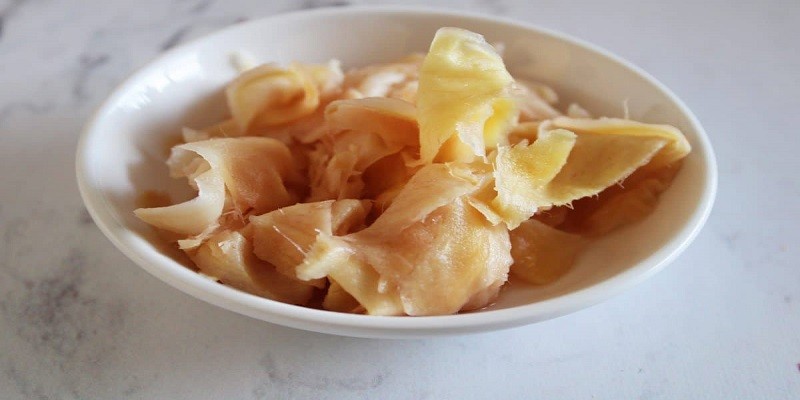Last Updated on July 25, 2024
Yes, you can eat pickled ginger while pregnant, but it should be consumed in moderation. Pickled ginger can help alleviate nausea and aid digestion, but excessive intake may pose risks such as heartburn or increased bleeding. Always consult your healthcare provider for personalized advice.
Pregnancy often brings about various dietary concerns, with expectant mothers seeking to ensure the safety and health of both themselves and their unborn child. One common query involves the consumption of pickled ginger. Known for its unique taste and potential health benefits, pickled ginger is a staple in many diets. This article explores whether it is safe to eat pickled ginger during pregnancy, its nutritional value, potential risks, and safe consumption practices.
What is Pickled Ginger?
Pickled ginger, also known as gari or amazu shoga in Japanese cuisine, is thinly sliced young ginger that has been marinated in a solution of vinegar, sugar, and salt. It is commonly served as a palate cleanser with sushi and sashimi to enhance flavors between different dishes. The pickling process gives the ginger a sweet and tangy taste, making it a popular condiment.
Nutritional Value of Pickled Ginger
| Nutritional Value | Details |
|---|---|
| Calories | 27 per 2 tbsp (30g) |
| Carbohydrates | 6g per 2 tbsp |
| Fiber | 2g per 100g |
| Vitamins | Small amounts of Vitamin C, B6, and other B vitamins |
| Minerals | Trace amounts of potassium, magnesium, copper, and manganese |
Risks of Eating Pickled Ginger During Pregnancy
| Risks | Details |
|---|---|
| Heartburn | Excessive consumption may cause heartburn or acid reflux. |
| Bleeding | Ginger can thin the blood, increasing the risk of bleeding. |
| High Sodium | Pickled ginger contains high levels of sodium, which may contribute to water retention and high blood pressure. |
| Allergic Reactions | Some individuals may experience allergic reactions to ginger. |
Safe Ways to Eat Pickled Ginger During Pregnancy
To safely enjoy pickled ginger during pregnancy, it is essential to consume it in moderation. Limit intake to small amounts and avoid eating it daily. Pair pickled ginger with balanced meals to mitigate any potential adverse effects. Always choose store-bought pickled ginger over homemade versions to reduce the risk of bacterial contamination. Consult your healthcare provider before incorporating pickled ginger into your diet, especially if you have any pre-existing health conditions.
Alternatives to Pickled Ginger During Pregnancy
| Alternatives | Precautions |
|---|---|
| Fresh Ginger | Use in small amounts to avoid excessive intake. |
| Ginger Tea | Ensure it is not too concentrated. |
| Ginger Ale | Opt for brands with real ginger and low sugar content. |
| Lemon Water | A natural remedy for nausea, but consume in moderation. |
| Peppermint Tea | Helps with digestion but should be consumed in limited quantities. |
Experts Tips
- Moderation is Key: “Consume pickled ginger in moderation to avoid potential risks”.
- Consult Your Doctor: “Always consult your healthcare provider before adding new foods to your diet during pregnancy”.
- Opt for Fresh Ginger: “Fresh ginger may offer more health benefits without the added sodium and sugar found in pickled ginger”.
FAQs
Can pickled ginger help with morning sickness?
Yes, ginger, including pickled ginger, can help alleviate morning sickness due to its anti-nausea properties. However, it should be consumed in moderation.
Is pickled ginger safe in all trimesters?
Pickled ginger is generally safe in the first trimester. However, it should be consumed in limited quantities during the second and third trimesters due to potential risks like bleeding and premature labor.
How much-pickled ginger is safe to eat during pregnancy?
It is recommended to limit pickled ginger intake to small amounts, such as a few slices per meal, and not to exceed 1,000 mg of ginger per day.
Can pickled ginger cause any allergic reactions?
Yes, some individuals may experience allergic reactions to ginger. Symptoms can include itching, swelling, and difficulty breathing. Consult a doctor if you experience any adverse reactions.
What are the benefits of eating pickled ginger during pregnancy?
Pickled ginger can help with digestion, reduce nausea, and serve as a palate cleanser. It also contains small amounts of vitamins and minerals beneficial for overall health.
Conclusion
In conclusion, pickled ginger can be a safe and beneficial addition to a pregnant woman’s diet when consumed in moderation. It offers various health benefits, such as alleviating nausea and aiding digestion. However, it is essential to be mindful of the potential risks, including heartburn, high sodium intake, and bleeding. Always consult with a healthcare provider before making any significant dietary changes during pregnancy to ensure the safety and well-being of both the mother and the baby.







